Could Football's VAR learn from other technology in sport?
After 3 years of the Video Assistant Referee (VAR) having been introduced to major football matches around the world we are still in a position where almost every week's fixtures are dominated more by the ongoing debate around VAR's performance than the results on the pitch.
Why is it that this only appears to be a serious problem in football and how can football learn from the many other sports around the world that appear to have come to terms with video-assisted decision making much more quickly than football has?
From having almost zero technology for officials to rely on (really only the goal line technology prior to VAR) from attempting to bring in an all encompassing system on a number of subjective decisions, it really is surprising that football has been so reluctant to learn from the experiences of other sports who have by in large adopted technology much earlier and in most cases in a more phased manner.
Of course, much like the Russian invasion of Ukraine, it's too late for the authorities to back pedal now so we must push on to Kyiv and hope that either the process improves or fans just learn to accept a failing system.
Let's assume that we all want the system to improve and on that basis here are 3 changes, I think that VAR could make based on what's already in place in other major sports.
The Referee's Call
In my opinion, the point of a technology like VAR should be to support the on field officials in their decision making rather than attempting to replace them.
In fact, the stated aim of VAR is to remove 'clear and obvious' errors rather than to attempt to replace the referee and their assistants. And yet, on a weekly basis we see the opposite happening...
Take for example, West Ham's disallowed goal against Chelsea earlier this season that would have resulted in them gaining a point from the game. Here the referee who as you can see from the still below is in a perfect position to see the incident and decided there was no foul, is called over by VAR to check again.
From what we've seen over the last 3 and a bit years of VAR, whenever this happens it means that a guy sitting in an office somewhere in North West London feels he is better placed than a referee standing 15 yards away to make a subjective decision and the original on-field call is almost always overturned.
I can understand if the referee's view is blocked or if he's otherwise unable to keep up with the play that having the ability to look at the incident again from a preferable angle or view would be a major advantage but surely that is for the on field ref to decide not the people running the technology!
This is very much the case in most other sports i.e. it's for the on field officials to decide whether they need support in making the decision as opposed to the technology trying to intervene.
Particularly when you consider that many of these decisions in football are subjective then you also have wonder what VAR is actually trying to achieve other than creating needless delays and frustrating fans?
However, it's not just subjective decision making that could do with a revamp, objective decisions such as offside should also be left largely to the on field officials to make in the first instance and again football can learn from other sports in this regard.
In cricket, for example, decisions surrounding LBW can be referred to the Decision Review System (the equivalent of VAR) which ultimately ends with a ball-tracking model being built by a computer system. The system will predict where the ball pitched (landed), where it struck the batsmen and whether it would go onto hit the stumps.
The technology known as Hawkeye has had its critics over the years but in general, it is recognised as being fairly accurate in predicting the path of the ball. However, given that the technology can not be 100% accurate there is a mechanism within DRS that allows for the on field official's original decision to add weight to the final outcome of the video review - it is known as "umpires call".
Without going into too much detail about the LBW laws which are VERY long and VERY complex the above image represents what is effectively a 'line call' in regards whether the ball would have gone on to hit its target.
The umpires original decision was to give this batsman out i.e. to the naked eye he thought the ball would hit the target had the batsman's leg not got in the way. The Hawkeye technology agreed with this but only just! Had the umpire have come to the opposite conclusion (he thought the ball would miss the target) then the evidence that Hawkeye produced would not have been enough to overturn the umpire's onfield decision - it's a simple way of both empowering human beings to continue to make decisions and recognising that the technology itself can never be 100% accurate.
Spurs were the subject of a similar 'line call' in their Champions League match this week.
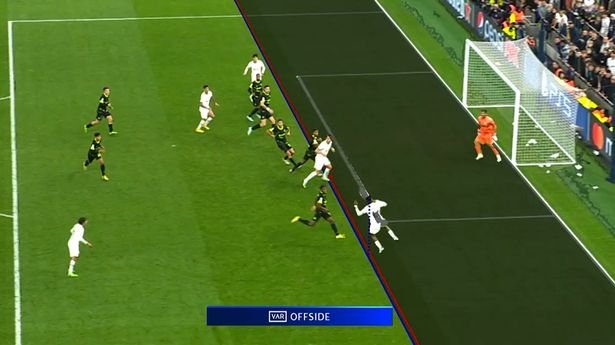
The decision has caused much debate and confusion over the actual offside rule but surely the overriding factor here is that you can't actually see the ball in the image that UEFA used to make the decision!
To keep things fair and ensure that it doesn't just seem as though I'm griping because I'm a Spurs fan, here's another decision this time that worked in Spurs favour from a match a few years ago against Sheffield United who would have won the game had their late goal stood.
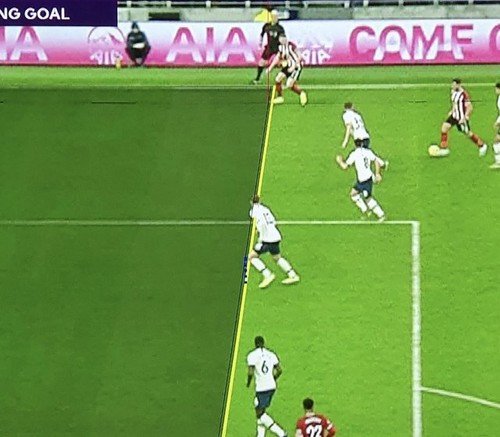
Again, the quality of the image that the decision was based on is poor and grainy which when we are talking about a couple of pixels being the difference between the goal standing or not does mean that the technology isn't very accurate!
Then you also have to consider that the player is only offside at the moment the ball is passed and that isn't something that the technology itself can tell you. Instead, it becomes a subjective decision by the VAR team as to when exactly to freeze the image. Roll it back a couple of frames (the equivalent of milli-seconds) and you might well find that the player's toe is now the right side of the line.
Finally, and as noted above, look at the position of the assistant referee who is perfectly placed to look down the line. The counter argument is that it's too close for a human being to call with 100% accuracy every time (and I would agree) but as I've just discussed, the technology itself is not 100% accurate so the idea that it will always do a better job is flawed.
This level of uncertainty should be filled with whatever the on field officials have decided in the first instance. In other words, where the technology cannot give you absolute certainty, it can't be used to overrule the original decision and instead it should stay with "the referee's call".
An Open & Honest Peer Review System
One thing that I find incredibly annoying about VAR is the lack of communication in regards to how a decision has been reached.
Take for example an incident in the match between Newcastle and Crystal Palace this season where VAR disallowed a goal for the home side on evidence that the goalkeeper had been fouled. Certainly, it was a nasty collision but if you look at the build-up, it was the Palace defender who pushes Willock into Guita causing the foul
Forget for a minute the fact that the FA and Premier League are now struggling to interpret their own rules and instead ask the question why the audience watching at home and at the ground as well as the players and coaches on either side aren't made aware of how the decision was reached?
In most of the other sports that I regularly watch the decision-making process when video technology is brought into play is shared with all those interested parties above and perhaps most importantly with the on field officials!
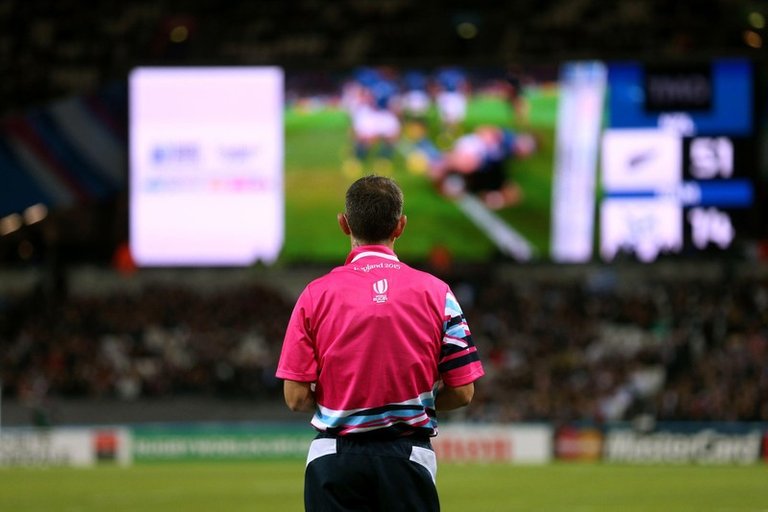
A replay in Rugby Union is shown on the big screen for the on field officials and crowd to watch while the discussion between the TMO and officials are broadcast at the ground and on TV source
We never hear any dialogue between the VAR team and the on field officials. The kind of dialogue, consensus-building and peer review system that we see happening, for example, in Rugby Union with the TMO would surely helps the referees to make better decisions and for everyone else involved to understand how and why they came to that decision.
Player & Coach Challenges
Tennis, Cricket, Rugby League and NFL to mention just a few sports all have the ability for players or coaches to challenge an official's initial decision if they feel they have been hard done by so why not allow footballers and/or their coaches the chance to do the same?
When you consider the fact that football has a bigger problem with player/coach descent than probably any other major sport then it seems logical to bring this feature in to help curb the issue.
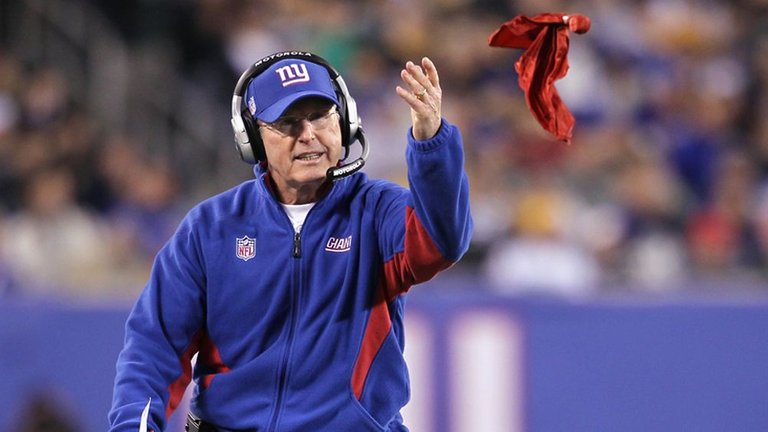
An NFL coach throws a flag signifying a challenge to a referee's decision source
Being able to use DRS in cricket to challenge the umpire's decision has become as much a part of the skill of a good captain as any other part of the tactics involved so why not challenge some of the Premier League's coaches who always have an opinion on the ref's performance to put their money where their mouth is!
Such a system would need to be thoroughly thought through with consideration given to what decisions can be challenged, how long after the incident a challenge can be made and how many challenges each team gets per match.
In many ways I think introducing this kind of feature would also help with some of the problems outlined earlier in the blog, namely that VAR is going beyond the original remit to only intervene in 'clear and obvious' errors. If you limit its use to either when the on field ref feels he or she needs it or when the players/coaches feel there's been a clear and obvious error then it would help to reestablish that core tenant.
As well as potentially improving decision-making I think such a step would also add an element of drama and intrigue to VAR with fans potentially playing their part in influencing whether their coach should review a specific decision or not.

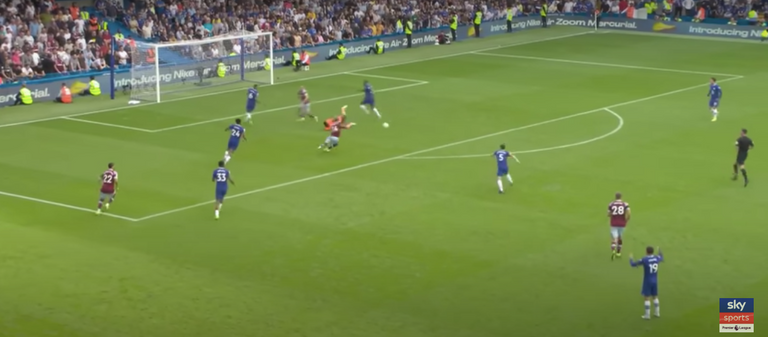
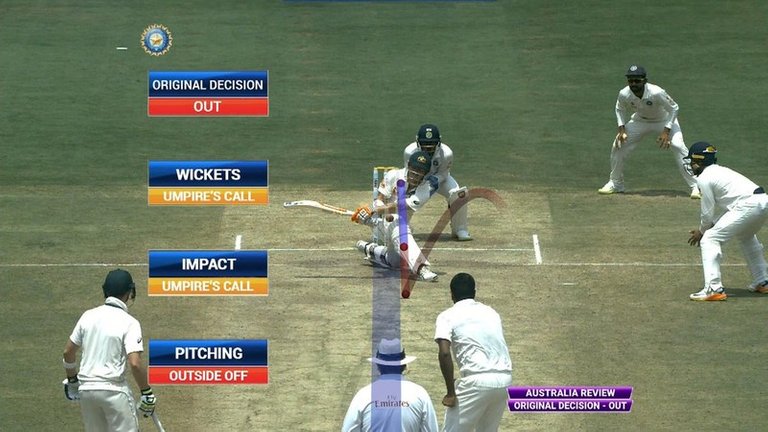
Hi @talesfrmthecrypt,
Thank you for participating in the #teamuk curated tag. We have upvoted your quality content.
For more information visit our discord https://discord.gg/8CVx2Am
Dear @talesfrmthecrypt,
May I ask you to review and support the new proposal (https://peakd.com/me/proposals/240) so I can continue to improve and maintain this service?
You can support the new proposal (#240) on Peakd, Ecency, Hive.blog or using HiveSigner.
Thank you!
Yep they need to stick to this! I suppose the issue with some video technologies especially with Rugby League in Australia and VAR is that there's still a human element which is prone to error and bias.
Goal line technology I believe is pretty good. It's black and white whether the ball crosses the line or not. VAR I suppose picks up issues which are contentious and open to interpretation which is why they should be left UNLESS clear and obvious as you said.
Very much so! I think in some ways the problem with VAR is that people thought it would solve contentious decisions. You could argue it’s made them worse but just adding another voice!
!BEER
View or trade
BEER.Hey @wolfgangsport, here is a little bit of
BEERfrom @talesfrmthecrypt for you. Enjoy it!If you like BEER and want to support us please consider voting @louis.witness on HIVE and on HIVE Engine.
You make some very good points here and I agree that VAR should be used a bit more sparingly unless something very clear was missed. I suppose it's kind of difficult to define when to use it or not use it though.
I do think decision making is better since VAR in fairness, but the impact on the flow of a game is huge and the spontaneity of goal celebrations is impacted too.
Yeah it is a bit of an excitement killer when a goal is disallowed. Even with Spurs late winner at the weekend, at first I was jumping around and then I remembered we what happened midweek and you just wait nervously and hope that VAR isn’t going to spoil the moment!
!BEER
View or trade
BEER.Hey @ablaze, here is a little bit of
BEERfrom @talesfrmthecrypt for you. Enjoy it!Did you know that <a href='https://dcity.io/cityyou can use BEER at dCity game to buy cards to rule the world.
Mad one. Do it like tennis and basketball. Each team can ask for a review once or twice per game. Once this is gone then its down to the ref.
Congratulations @talesfrmthecrypt! You have completed the following achievement on the Hive blockchain and have been rewarded with new badge(s):
Your next target is to reach 20000 upvotes.
You can view your badges on your board and compare yourself to others in the Ranking
If you no longer want to receive notifications, reply to this comment with the word
STOPCheck out the last post from @hivebuzz:
Support the HiveBuzz project. Vote for our proposal!
Congratulations @talesfrmthecrypt! You received a personal badge!
You successfully registered for the HiveBuzz World Cup 2022 Contest.
We hope you will enjoy this event and will have fun. Good luck!
You can view your badges on your board and compare yourself to others in the Ranking
Support the HiveBuzz project. Vote for our proposal!